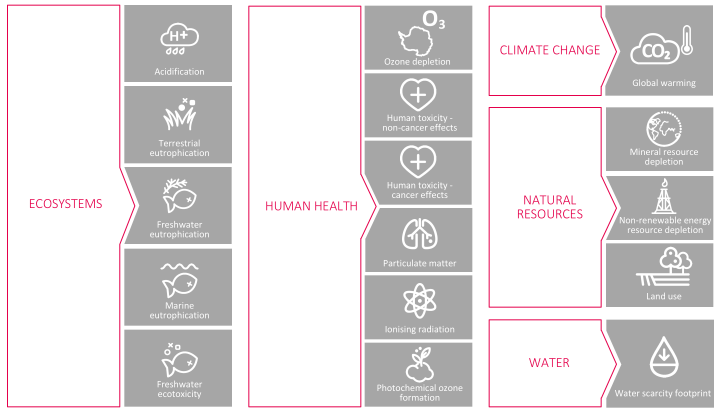Imagine you have landed in 2030. You walk into your usual grocery store. Only this time, every product sports a label to help you make your purchasing decision based not only on price, or calories, but also on environmental impact.
That is what the European Union Product and Organization Environmental Footprint (PEF/OEF) initiative set out to achieve. Having gained major momentum, this could become the gold standard for robust, standardized product and organization footprints across entire value chains. The European Commission is now gearing up to submit a policy proposal in 2018, in an effort to encourage industry to adopt the resulting Category and Sector Rules. The initiative is also set to enter a transition phase in 2018, extending an open call for pilots from new industrial sectors.
Production and retail business must therefore get ready to change the way they make and sell their products to match stakeholders’ expectations. Having led 5 of 27 pilot programs, Quantis lays out an approach for companies to ensure they do not get left behind. The first of a 2-part series describes the PEF/OEF rationale, as well as the key business benefits in answering this call to action.
Securing stakeholder consensus on environmental footprinting
Over the past 20 years, international and country-specific initiatives (such as the ISO and the GHG or ENVIFOOD Protocols) have streamlined product and organization impact assessments across sectors and regions. While consensus was being sought, global companies held back, finding meeting diverging standards too resource-intensive and complex. The PEF/OEF initiative tackled this challenge through broad stakeholder dialog, bringing EU as well as non-EU countries to debate with NGOs and industry leaders. This stakeholder alignment will prove critical in mainstreaming this environmental footprint assessment and reporting methodology.
Rolling out cross-sector approaches enables businesses to leverage key learning from the past proliferation of standards and methodologies. Pilots bring industries to take leadership in reducing the impacts of their products and organizations, whilst anticipating regulatory risks, should environmental labeling become mandatory.
The PEF/OEF focused on 27 industrial sectors, which together amount to 50% of the carbon footprint of the average shopping basket. In doing so, the initiative prioritized key impact categories (see Figure 1), identifying potential trade-offs for partnering companies, ensuring technical consensus on definitions, establishing secondary default data where necessary, ultimately enabling organizational performance assessments, benchmarking, and the comparison of product performance at sector level and over time. Specific topics were also examined, such as allocations, packaging, transport, biodiversity and environmentally sound innovation.

Figure 1 – The PEF/OEF Guide lists all environmental impact indicators to assess,
in line with the European Commission’s call to apply the latest LCA methods.
The benefits of early participation in the the PEF/OEF initiative
By involving in an existing pilot or by developing new PEF Category Rules and OEF Sector Rules, companies can weigh in on the development of future standards and their potential enforcement, in a way that balances business and technical considerations.
Such efforts will likely be updated in the coming years, so that partnering industries should seize the opportunity to anticipate the appropriate resources to maintain sectoral leadership. Most of all, participation in the PEF/OEF is an opportunity for companies to secure a competitive advantage, by determining the standards against which their entire sector will soon come to be evaluated. Getting onboard the PEF/OEF now evens out the adaptation curb, empowering organizations to address potential issues with Category and Sector Rules as they arise.
Onboarding LCA approaches breaks down the complexity of tackling multiple environmental challenges. At their core is indeed a weighting approach, which reflects corporate aspirations to prioritize material issues aligned with stakeholder demands. Finally, getting the big picture avoids key issues falling through the net: strategies (and eventually, marketing campaigns) will be all the more consistent as companies will have already integrated the means to measure, contextualize and demonstrate the sustainability of their business case.
Anticipating next steps for the PEF/OEF transition phase
Ongoing debates are currently focusing on how to communicate product and organization footprints to consumers, more accurately and in a comparable manner. The goal is for companies to consider their influence on consumer behavior and their ability to facilitate informed, environmentally sound purchases. To date, proposals for universal product labeling have been met with heated debate. While the aim of such debates is to reach consensus on LCA-based labeling, Quantis could not stress enough the need for industry to anticipate regulatory efforts and examine what product labeling might mean for their operations.
Fast forward to 2018, the European Commission anticipates a major policy-making effort and will be extending an open call for new companies to engage in formalizing Category and Sector Rules. As such, Quantis strongly recommends joining the initiative to its European client portfolio as well as companies looking to sell or expand operations to Europe. This will help them carry out comprehensive product and corporate footprints, identify environmental hotspots and engage with internal and external stakeholders for sustainable change.
To learn how to tap into the benefits of early PEF/OEF participation, contact project lead Carole Dubois.
Get the latest insights, trends, and innovations to help position yourself at the forefront of sustainable business leadership—delivered straight to your inbox.
Sustainable Brands Staff
Published Oct 31, 2017 11am EDT / 8am PDT / 3pm GMT / 4pm CET